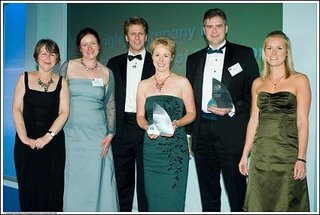

National Training Awards Winner - The Wrigley Company Ltd & Simon Phillips of Simesco Limited
“National Award for Making Flexible Working Work”
Simon Phillips of Simesco Limited scooped the South West Region National Training Award last night (Thursday 26th October) for his work with The Wrigley Company.
A new culture of flexible working practices at one of the UK’s best known confectionery manufacturers has been hailed as a success by UK Skills, the organisation behind the most prestigious awards for skills development.
The Wrigley Company, based in Plymouth, introduced new flexible working practices through a change programme carried out in partnership with Simon Phillips of Simesco and it made a dramatic impact on the culture of the organisation as well as receiving a positive response from staff.
“There was a clear recognition that there was a need to help associates in working smarter and achieving work-life balance,” said Director of People Learning and Development Helen Franklin. “We believed flexible working would bring very real quantifiable benefits, including greater personal effectiveness and higher levels of job satisfaction. But such benefits wouldn’t be realised without supporting the initiative with training and development for individuals and managers.”
Simon Phillips and associate Jenny Tunley Price, recruited and trained a core team of seven “Flexible Working Champions” to help managers with the roll-out. A series of masterclass workshops took place in the second half of 2005.
Within a few weeks of attending the training, associates were reporting successes such as eating lunch regularly, getting home at a reasonable time and feeling more valued by the company and their manager.
Managers embraced the training on implementing flexible working, even in areas where there had been initial suspicion.
In a survey in February this year, 78 percent of associates said their work schedule was sufficiently flexible to meet their personal and family needs, compared with 43 percent three years earlier.
“The programme has enabled the organisation to make cultural change that will support future success,” said Ms Franklin.
